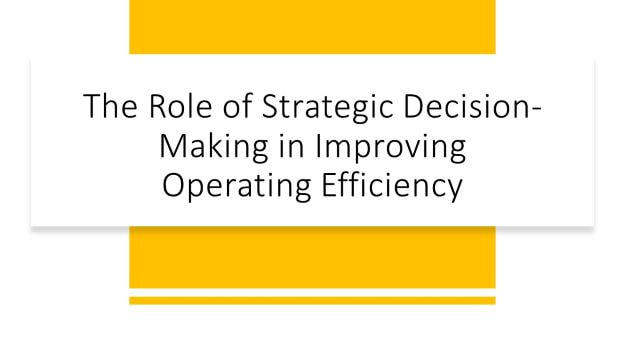Strategy selection is the process of evaluating and choosing courses of action
A successful strategy is similar to a good life--continual improvement is key. To achieve that goal, a strategy must be regularly reviewed and evaluated. Achieving that goal requires self-awareness and the ability to constantly improve. Therefore, strategy evaluation is vital to the continued growth of an organization. The following are some ways in which strategy evaluation can help improve the operating efficiency of a business.
The process of strategy selection involves evaluating the effectiveness of a strategy and the effectiveness of its implementation. The evaluation will help identify flaws in the strategy and make corrective action decisions if necessary. It will also help a manager decide whether to formulate a new strategy to address shortcomings. The final stage of the strategy evaluation process is to judge the appropriateness of a chosen strategy.
Delegated decisions deliver faster, better, and more efficiently executed outcomes
Often, delegated strategic decisions are smaller in scope than big bets. They also tend to be more frequent and routine - aspects of day-to-day management. But they have a multiplier effect - and flawed delegating processes can lead to disastrous results. The benefits of delegating strategic decision-making to the people closest to the work are numerous. Not only does delegation improve execution, it also fosters employee engagement.
Good delegation begins with clear, delegating boundaries. Then, the decisionmakers are explicitly held accountable for the parts of the decision-making responsibility they are charged with and are given the opportunity to develop those skills. Then, they are explicitly held accountable for the outcomes of decisions if they fail to respond or act. That way, people know exactly how much they're being asked to do.
Executives influence outcomes
Using the right decision-making methods, business executives can significantly influence the results of their organizations. Executives must understand the decision-making process and the field in which they operate. Routine judgments do not depend on common biases.
Regardless of the nature of the strategic decisions made by executives, a successful implementation requires commitment from key stakeholders. Commitment to new initiatives is rarely easy, especially when the stakes are high. Commitment can be difficult in a big-bet situation where key players acquiesce reluctantly. In one mining company, executives often agreed to new tasks, but failed to follow through and made little or no commitment to the changes.
Executive involvement
Strategic decision-making for improving operating efficiency is crucial for a business to thrive. It is an essential management skill that enables the company to make the best use of its resources while ensuring optimal return. Examples of strategic management decisions for improving operating efficiency include reducing inventory waste and increasing productivity. An effective way to implement employee involvement in strategic decision-making is to share executive assistants. This approach can significantly boost productivity and increase trust among employees.
Index components
The components of strategic decision-making in improving operating effectiveness are broad and diverse. They come from the organization's vision, mission, and goals, and address issues such as allocation of major resources, timing of application, competitive actions, and expected outcomes. A manager's work is primarily to solve problems, but he can also make strategic decisions to achieve these objectives. The index components of strategic decision-making in improving operating efficiency highlight these key aspects.
A strategic decision may affect multiple aspects of a business, including equipment, facilities, and employee training. The index is no longer based solely on cost control, but includes global performance measurements such as product quality, operational flexibility, and customer service. It is necessary to understand how technological advancements can improve a product's value. The decisions that the company makes today can have a dramatic impact on the company's future.
How fast a decision is made and how good is that decision determines how far the business will thrive. |
Related reading:
#operationalexcellence #strategicdecisionmaking #strategy #improvingoperatingefficiency #strategymanagement #decisiontools #decisionmaking #strategicplanning #challengesofdecisionmaking





















